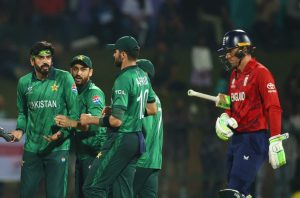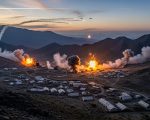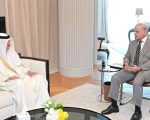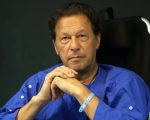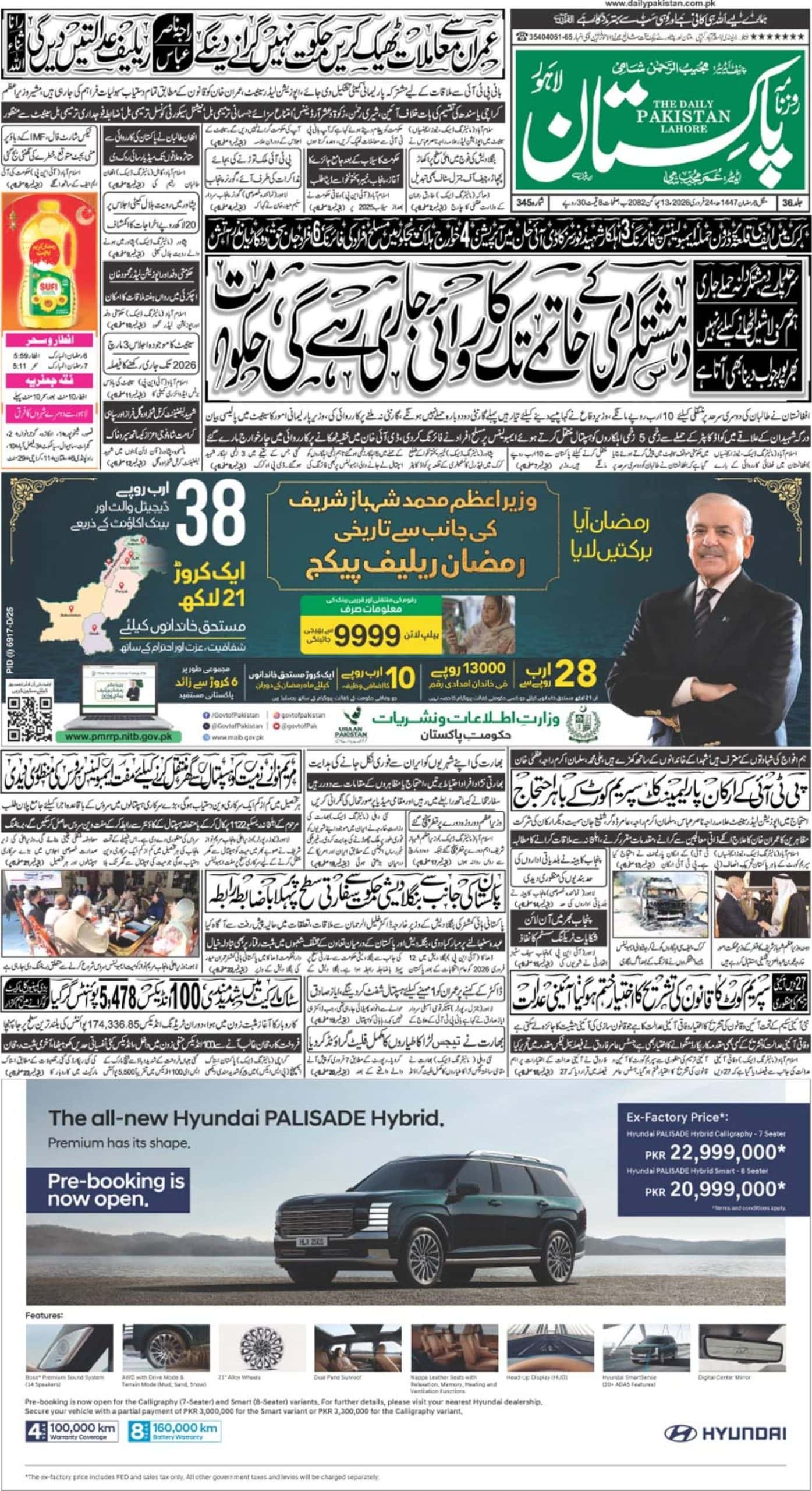Quartet-Qatar row has been dragging on since June 5. All along, other geopolitical tornadoes, much smaller in impact and scope, stole the media glare. Nonetheless, the world has managed to adapt to a whole range of intra-GCC feud stories. Even on a weekly basis, it is getting harder to maintain a chronology of backstabbing. Occasional leaks make their way to social media, eventually to snowball into category IV hurricanes loaded with slurs and half-truths. Given the deep sense of tribal history amongst Arabs, conspiracy theorists and hate-mongers curate incidents that took place generations ago. For a bystander, the war seems imminent. To the eager observers, it isn’t. The simmer phase will continue and the military option is not a possibility. Asymmetric warfare is becoming more entrenched. The threads of ethno-political relations get more tangled with each new overt punitive action as well as covert schemes.
The hybrid feud is aimed at crumbling Qatar under the weight of its own tax-free economy and the boisterous lifestyle of its citizens. While the banks are negotiating mergers, the hospitality industry is experiencing the unimaginable. Rooms are empty despite lowered rates. A few hotels have shut down while others are busy rightsizing. Braving the losses, the Qatari business community has shown no fissures yet. Quartet blockade has injected the spirit of nationalism amongst the Qatari people, who have blood relations scattered across Saudi Arabia, Bahrain and the UAE.
The economic fall out
Besides strategic investments in global brands and real estate, Qatar maintains a colossal sovereign fund primarily meant for the day-after hydrocarbons. Since commodity prices have been maintained almost at the pre-June 5 state, the government had to pay hundreds of millions of dollars in subsidies. What used to be shipped or trucked from fellow GCC countries costs more when exported from Turkey or elsewhere.
As per Iranian media, Tehran and Ankara have signed a deal with Doha for the creation of a joint working group to facilitate the transit of goods between the three countries. It also said the three nations aimed to tackle “obstacles to sending goods from Iran and Turkey to Qatar”.
Over the past five months, Turkish exports to Qatar have shot up by 90 percent to $300 million. Meanwhile, Turkish media reports that Qatar has desired to invest another $19bn in Turkey in 2018, of which $650 million will be dedicated to agriculture and livestock ensuring the country’s food security.
In addition, Qatargas, the world’s largest producer of liquefied natural gas (LNG), inked an agreement with Turkey’s Botas to deliver 4.5 million tonnes for three years.
Last week, President Recep Tayyip Erdogan paid a two-day visit to attend the third meeting of bilateral strategic committee besides visiting his troops’ base in Qatar.
On the aviation front, Qatar Airways was not a participant in the region’s largest aerospace event, Dubai Air Show. UAE has been using the row with Qatar to hurt the airline, which poses serious competition to its Emirates and Etihad. Meanwhile, Qatar’s Commercial Bank is in negotiations to sell 40% stake in the United Arab Bank to the UAE’s Tabarak Investment. Similarly, 25-storeyed Dolphin Tower in Doha, owned through an investment vehicle by UAE’s Sheikh Hamdan Bin Zayed Al Nahyan, is also on sale. The building is the Qatari headquarters of natural gas supplier Dolphin Energy.
Meanwhile, Qatar probes an alleged plot by the UAE to weaken its currency. The alleged plan come to light through leaked emails of UAE Ambassador in Washington Yousef Al-Otaiba.
However, the International Monetary Fund continues to determine that the quartet row has had a limited impact on the Qatari economy, while warning that persistent crisis will have adverse consequences for the region’s mid-term growth.
The IMF Regional Economic Outlook forecasts weakening of medium-term growth prospects, not just for Qatar but also for its other GCC neighbours in the event of the unresolved crisis.
Qatar’s ramping up of defence and diplomacy
From participating in the meeting of the International Coalition against ISIL in Jordan to engaging in bilateral multilateral diplomacy with the countries far and near, the gas-rich nation is exhibiting self-confidence of a reliable partner.
While the King of Morocco made the first flight between the UAE and Qatar, Doha’s top diplomat Mohammed bin Abdulrahman Al Thani visited Muscat for deliberations with his Omani counterpart. US Treasury Secretary Steve Munichin visited the country too. The Qatari embassies have been the busiest in recent years across the world, yielding impressive results despite limitations.
Absorbing the economic impact of the blockade, Doha is not ready to take chances on the security front. For instance, it’s augmenting the air force capacity from a mere 12 Mirage 2000s to 72- fighter jets including the F-15s, Rafale and Typhoons.
After the US Congressional approval of the $12 billion deal, Qatar’s 36 F-15QA are in the early stage of production at the Boeing’s premises. The country is already awaiting deliveries of 24 Dassault Rafale fighters from France, about $7.6 billion deal signed in 2015. Last but not the least, the deal for UK’s Typhoon fighter jets also nearing finalization. Qatar will have to wait until 2024 while Oman and Kuwait receive their orders by 2022.
Realizing Moscow’s urge for a greater role in the Middle Eastern affairs, Qatar also signed military pacts ranging from boosting air defense system to other military hardware. For now, details are sketchy but the likelihood of Doha’s purchase of S-400 air defense system is extremely high. Turkey and Saudi Arabia are already acquiring the weapon system. Besides the western countries and Russia, the Gulf state has also signed an accord to enhance security cooperation and coordination. Even though the details are sketchy, Doha’s desire for a functional military relationship with all the key stakeholders is vividly evident. Airforce and air defense are not just the only areas receiving attention, the naval fleet, as well as the army too, are set to acquire more fire power with effective reach beside honing fighting skill through drills with friendly countries.
Meanwhile, Bahrain and the UAE seem frustrated with the row with Qatar being on the backburner of Saudi Arabia in the presence of unprecedented scale of corruption cases involving princes and top bureaucrats. Manama has tried to reopen the border dispute with Doha. Bahrain claims “every right to claim what was cut off forcibly from its land and to dispute the legitimacy of the Qatari rule”. An international court resolved the border dispute in 2001. Typically, the settled issues within Arab remain only temporarily so.
Qatar’s military replenishment may be long term but rooted in today’s relatively unexpected circumstances. The complex neighbourhood is beyond the states that are geographically located. The US, the UK and France remain actively engaged in diplomacy and militarization of the region. The outbreak of intra-GCC military conflict is the least foreseen scenario for them. The prolonged simmering tensions have persistently served their interests in the post-colonial world. However, the GCC has its dynamics, given the pressure from quartet to shun the persecuted country.
The guessing game continues
Qatar’s economy has withstood enormous shocks and can take more. The state has and will avoid reaching the stage whereby it has to impose taxes. Doha seems to continue disposing of its assets slowly to manage to stay afloat. The currency has to remain stable while the prices must remain in proximity to pre-June 5 levels. Meanwhile, Turkey takes the lion’s share in exports to Qatar, Iran has benefited from transit trade. Tehran’s products like milk and fruit have a better showing on the market yet remain uncompetitive with European and Turkish brands. Overall, hostility towards Iran due to its extreme actions in Syria has lessened significantly. As long as Doha hosts the US base on its soil, prospects of further warming up of ties with Tehran are seriously limited. The quartet has banked on Washington significantly to keep Doha in check. The tactic has failed to coerce the ting Gulf state into submission.
The UAE and Bahrain are keeping the row in the news with provocative statements as Saudi Arabia and Egypt look inwards. Of late, however, frustration has been more obvious in some officials’ tone who stated that lack of compromise on the quartet’s part is motivated by the desire to change Qatari leadership, which is a thick red line.
There’s talk of an impending breakthrough ‘soon’ once King Salman and his son Crown Prince Mohammad bin Salman settle the graft-related probe. It is anybody’s guess as to how Abu Dhabi, Manama and Cairo will react when Riyadh and Doha pick the thread from the time the two leaders spoke over the phone in September. Qatar has been ready for Kuwaiti, American or European mediation while expressing willingness to discuss all issues except closure of Al-Jazeera Network. In a positive gesture, Saudi Arabia still lists Qatar as a member of its Anti-Terror Coalition while has not yet been expelled from the Gulf bloc.








